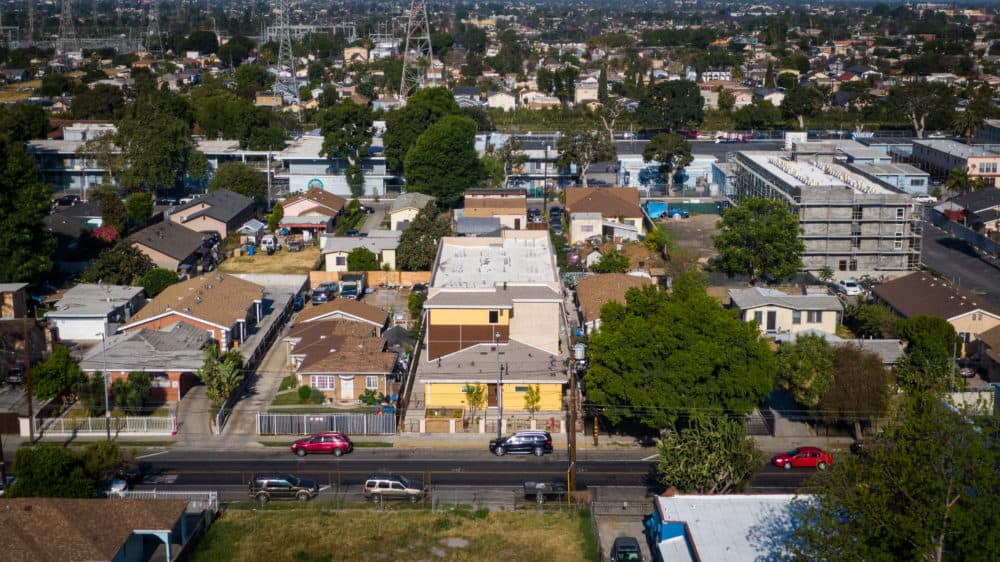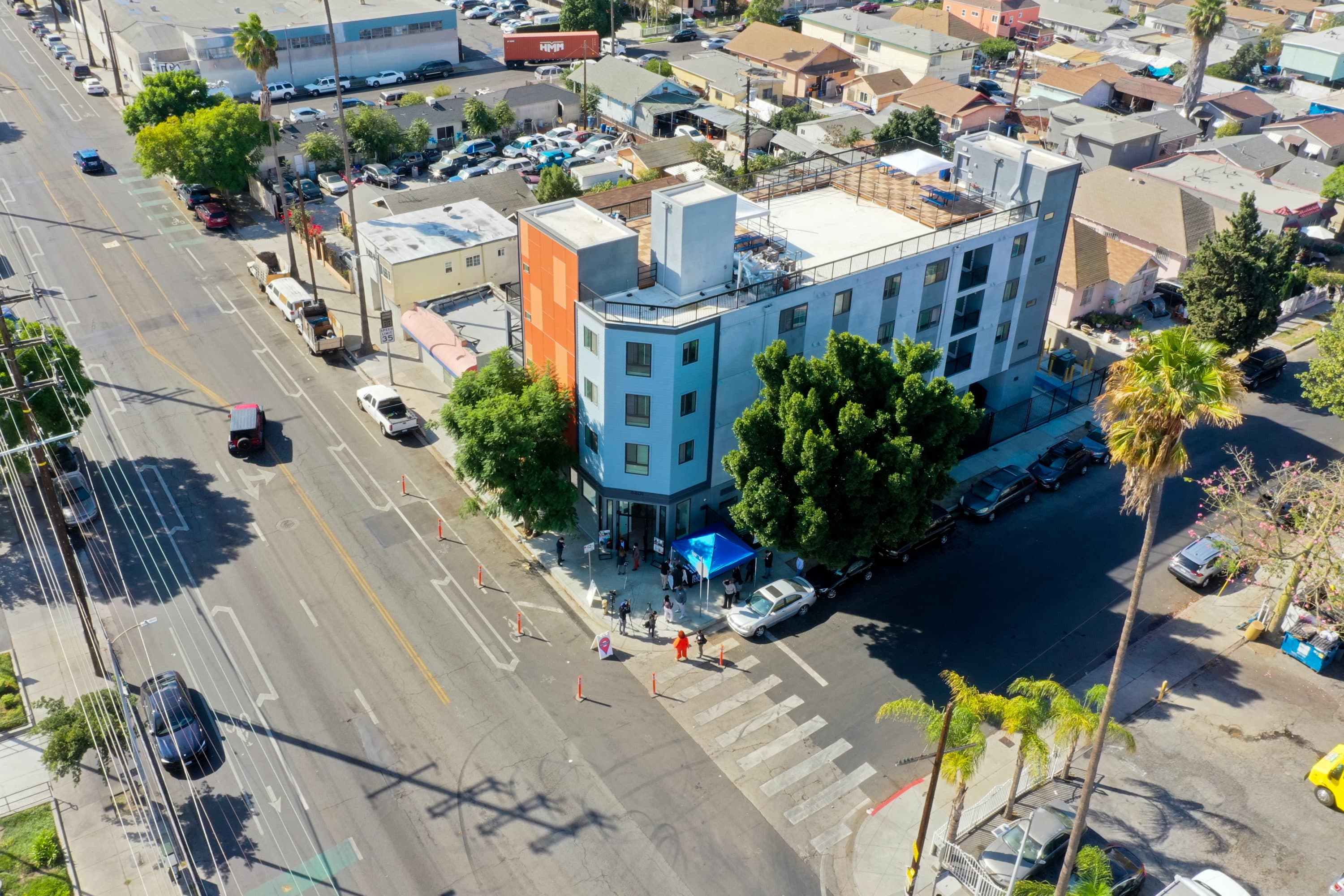Advertisement
Inside one developer's big bet on affordable housing in Los Angeles
Resume
Sign up for the On Point newsletter here.
Housing costs too much in many American cities. But in LA, one developer says he's got a solution.
"We've been able to build high quality, affordable housing for $250,000 per unit," Martin Muoto, founder of SoLa Impact, says. "Which is roughly half of what many traditional housing developers, particularly those using government funding, have been able to do."
How does he do it?

"Using private capital and free market forces, you're really able to bring innovation to the process," Muoto says.
And he claims, no gentrification.
"We've been able to keep residents successfully housed, many of whom have been formerly homeless," he adds.

Today, On Point: Building affordable housing affordably.
Guests
Martin Muoto, founder and CEO of SoLa Impact, which works with investors to build affordable housing at lower cost without public funding.
Mike Loftin, non-resident fellow at the Urban Institute. CEO of Homewise, a non-profit which builds affordable single-family homes.
Also Featured
Chaka Pruitt, SoLa tenant, mother and grandmother.
Wilnet Robinson, SoLa tenant, retiree and grandmother.
Interview Highlights
On how SoLa Impact works
Martin Muoto: "All of these levers are important to try to go after the housing crisis. And in California, we often forget that this is the fifth largest economy in the world. And the number one issue that is facing California right now is the lack of affordable housing and homelessness. That's really driving people out of the state. And I think a lot of the government programs have really just, not unlike what happened perhaps in the '80s and '90s with defense contractors, where the costs just got tremendous. A hammer would cost $800 when it was sold to the government.
"I think it's less a criticism as an observation that there hasn't been the incentives in these other vehicles to drive down costs. And candidly, the bureaucracy of getting those funds, the availability of those funds, even the developers that use government financing, find it. It takes years to get the necessary compliance done. It's very bureaucratic. It ultimately leads to these significant cost overruns. And that's just what the alternative has been for affordable housing, for the most part."
How many units have you built?
Martin Muoto: "We currently own 1,500 units in the broader South Los Angeles area that we acquired over the last several years. We are currently in construction on an additional 1,500 units that are at various stages of construction and completion. And in our latest fund, called the Black Impact Fund, we'll be building somewhere between 3,500 and 4,000 units, all in Southern California, with the majority of them in Los Angeles."
What are you doing to cut costs with materials?
Martin Muoto: "We've had this conversation with dozens of investors over the years to really scrutinize, How are we being able to build at $250,000 a year? And certainly that's being challenged with all the things that are happening today with inflation and supply chain. But fundamentally, it comes down to being able to standardize your development and your construction process, being able to radically simplify it. And obviously being able to scale it. And so over time, what we can do is scale, simplify. And simplify in a way that we can rapidly repeat the process.
"So I think folks look for one big lever or two big levers, but really being able to build at these rates requires unrelenting focus on cost. And it's a hundred small levers. We standardize the size of our windows across as many of our buildings as possible so that we can buy them in volume. Before the COVID pandemic, we had purchased large lots of wood.
"And because we have so many projects going on simultaneously — right now, we have over 30 projects that are at various stages of construction. We can forward by things like windows, and wood and showerheads and toilet seats. And so every aspect of what we do is focused on ensuring that we can build faster, cheaper and better product."
Are you using entirely documented workers?
Martin Muoto: "L.A. is a very competitive construction market. We typically don't use union labor, but we do pay what are roughly similar wages to a lot of the folks that are out there doing plumbing, electrical. Those folks that are subcontractors are often getting $80,000 to $120,000. It's just simply a competitive field.
"And so I think people tend to point to prevailing wage or unions as the key driver of the cost. And candidly, I don't think that's really the case. It certainly accounts for 5% or 10% difference. But ultimately, it has to do with all the aspects that go into building a project. So the prevailing wage issue, I think is a bit of a red herring."
Is this idea scalable in other cities?
Mike Loftin: "We do a very similar thing in Albuquerque and Santa Fe. Santa Fe is a pretty high-cost market. With home ownership, housing. And we will use government subsidy if it's available. But a lot of times what we're doing is we're intervening in the market. So we'll do a high-end home that can cross-subsidize an affordable home. And so there has to be, I think, part of the issue we're dealing with is there's this history of how housing, affordable housing policy has evolved in America.
"And nonprofits who do a lot of subsidized housing will call what Martin's doing will call it naturally occurring affordable housing or NOAH for short. As if it's some kind of weird phenomenon that just got discussed. The vast majority of Americans live in housing that is affordable within the marketplace. The subsidized housing is the outlier. And I think you've had this debate in policy for many, many years, since the '40s. Of, do you do public housing and try to replace the market, or do you intervene in the market to make housing work better?
"So from a government point of view, we should be looking at policies that help people like Martin be more efficient and more effective and get more done, not try to replace the marketplace. ... Housing should not be a public works project. It's something that has market dynamics to it. And if there's a market dynamic to it, that's what you have to pay attention to the cost."
This is the Holy Grail of market-based economic development. Why hasn't it happened before?
Martin Muoto: "Fundamentally, as I started, as I described when I went into these areas, which are predominantly Black, brown areas, a lot of folks and as I've raised capital, a lot of folks go, boy, that sounds very risky. And these are communities that have historically been underinvested in.
"So I think that there's a reason why redlining was something that was regulated against. And so it has been certainly a challenge to bring along, particularly institutional investors to really look at this opportunity objectively and say, look, you can do well while doing good. These are areas that desperately need large capital. And to some degree, you've got to really find ways to bring the community along.
"And I think that part, while we're focused very heavily on construction and that's an important part, building housing is not enough. You've got to do more. You've got to make sure that the tenants see the benefits, the residents see the benefit, and the community overall finds ways to prosper. And for us, that's meant doing things in education, doing things in access to capital, promoting entrepreneurship. I mean, ultimately, those are things that ensure that ... you're growing the pie for everyone. And that's equally important, to be frank."
Audio Highlights
Listen: Chaka Pruitt walks us through her SoLa Impact apartment
Chaka Pruitt has been living in a SoLa home with two of her children for almost five years. Her other children are grown up. She described her apartment to us.
As nice as her building is, her neighborhood is dangerous:
But, Chaka says, her neighbors are motivated to keep the building well-maintained and clean.
Pruitt also told us that SoLa doesn’t just provide residents in South Central LA roofs over their heads. It also provides a variety of social services:
Listen: Wilnet Robinson on life in her SoLa Impact home
Wilnet Robinson is a grandmother in her late 60s. Over the years, she’s worked in mass communication, film and television and computers.
When work dried up, she experienced homelessness. Then, five years ago, she applied for a SoLa home:
Robinson says SoLa vets its tenants carefully. But SoLa is also a very different kind of landlord.
This program aired on October 11, 2022.

